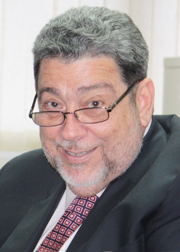
KINGSTOWN, St. Vincent, March 15, IWN – Vincentians are being encouraged not to focus too much on the failings of the three persons who have so far been proposed as national hero.
Politician George Augustus McIntosh (1886 – 1963), Ebenezer Theodore Joshua (1908 – 1991), a former premier, and Robert Milton Cato (1915 – 1997), a former premier and the nation’s first Prime Minister, have been proposed to join Joseph Chatoyer (died March 14, 1795) as national hero.
“Now, none of these three persons are perfect and, at different time, they did certain things which you disapproved of. But what are you going to do? You are not going to simply take one factor with which you disagreed in their lives and in a sectarian manner elevate it above all the extraordinary good. You have to give a total, overall, balanced judgement,” Prime Minister Dr. Ralph Gonsalves said Thursday — National Heroes Day.
“… the closer you are to people, the more knowledge you have about their weaknesses and you will want to emphasise their weaknesses so much and forget about their strengths and overall contributions,” he further said at the Wreath-Laying Ceremony at The Obelisk in honour of Chatoyer in Dorsetshire Hill.
“We are not the Roman Catholic church which declare saints … after they have two confirmed miracles. That is not the issue of national hero. That is a different business. Sainthood is different.”
Gonsalves further said that citizens should not allow their politics to prejudice their views of the candidates.
“We must not in St. Vincent and the Grenadines say that because you support The New Democratic Party that you should do Joshua and not Cato. Or if you are in the Labour Party you must do Cato and don’t do Joshua.
“We must leave those things in the dustbin of history — those prejudices — and assess them in the light of their extraordinary work. That’s how we must make the judgement.”
Gonsalves said the idea behind national heroes “is for us to exalt those who have lived before us who have made contributions at such a level or who have engaged themselves in heroic deeds of such a type as to justify their elevation to the status of national hero.
“[it is] not simply to recognise them, but for us to learn from them and their lives so that the time which we have which is called the future, is something which we must not desecrate.”
A person can be nominated for national hero if he or she:
a) Has given outstanding service to St. Vincent and the Grenadines and his contribution has altered positively the course of the history of Saint Vincent and the Grenadines.
b) Has given service to St. Vincent and the Grenadines which has been exemplified by visionary and pioneering leadership, extraordinary achievement and the attainment of the highest excellence which has redounded to the honour of Saint Vincent and the Grenadines.
c) Has through his heroic exploits and sacrifice contributed to the improvement of the economic, social or political conditions of Saint Vincent and the Grenadines and Vincentians, generally.
The person must also be deceased.
“In the case of Chatoyer, you can pick anyone of those and he would have qualified. But it doesn’t mean that every persons you select thereafter to be national hero must have all three,” Gonsalves said.
“… We have done one (national Hero) on which we all agree and then we are talking about others,” Gonsalves said.
Nomination for national hero can be made to the National Heroes Committee, which will then submit a report to Cabinet.
The Cabinet will advise the Governor General on who, if anyone, should be declare National Hero.





